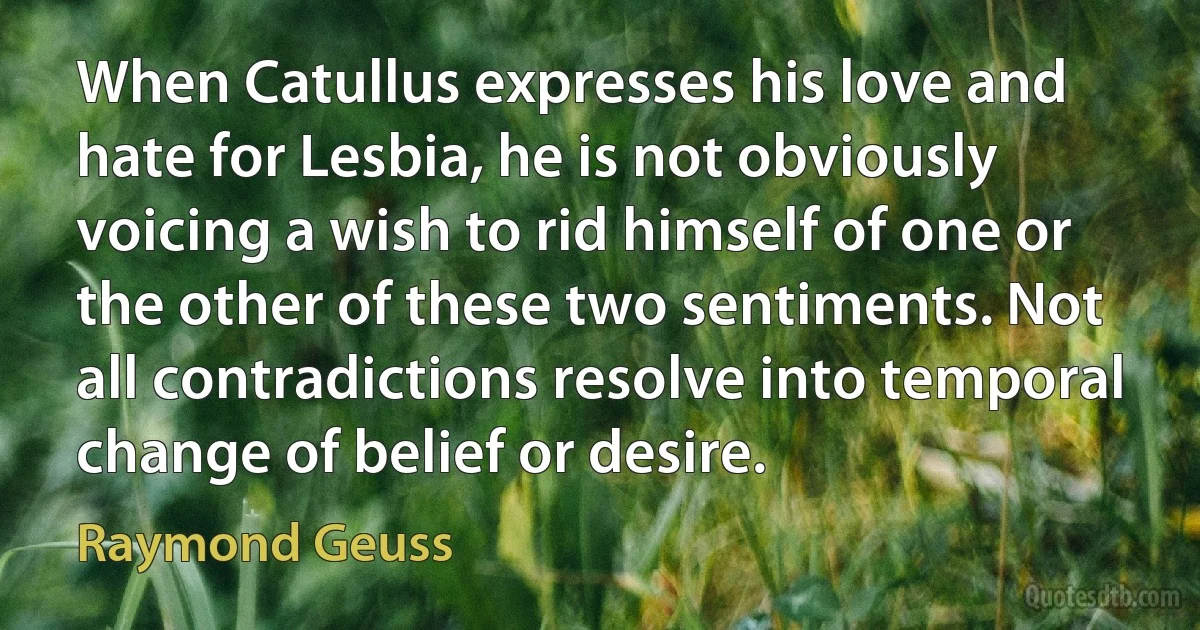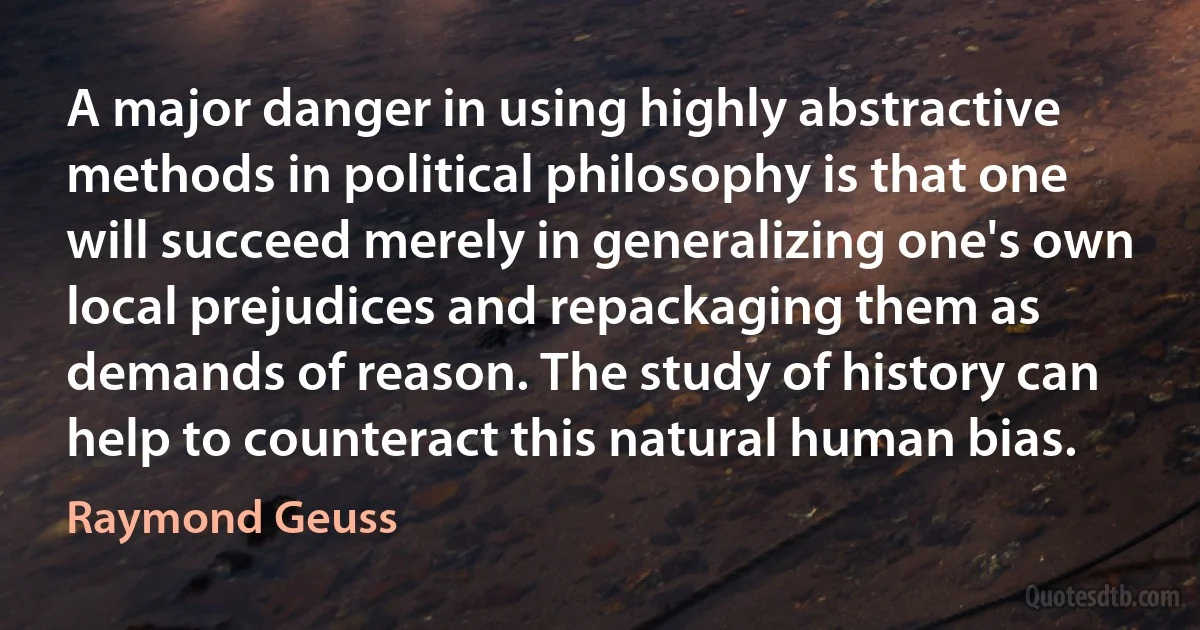Raymond Geuss quotes
To the extent to which the pull that moves me really is irresistible, like an invincibly strong addiction, the normal procedures of evaluation, deliberation, choice, decision, etc. that constitute the substance of our political life are not operating. The same is true of overwhelming aversion. The person being tortured who simply wants it to stop, period, is also not a good model for an agent acting politically.

Raymond Geuss
It would be a mistake to believe that one could come to any substantive understanding of politics by discussing abstractly the good, the right, the true, or the rational in complete abstraction from the way in which these items figure in the motivationally active parts of the human psyche, and particularly in abstraction from the way in which they impinge, even if indirectly, on human action.

Raymond Geuss
Nietzsche seems sometimes to replace the "transcendence” which stands at the center of traditional accounts-the existence of a transcendent God, or, failing that, a transcendental viewpoint-with that of a continually transcending activity. ... There is no single, final perspective, but given any one perspective, we can always go beyond it.

Raymond Geuss
In some central and important cases, ... the existence of specific power relations in the society will produce an appearance of a particular kind. Certain features of the society that are merely local and contingent, and maintained in existence only by the continual exercise of power, will come to seem as if they were universal, necessary, invariant, or natural features of all forms of human social life, or as if they arose spontaneously and uncoercedly by free human action.

Raymond Geuss
Humans in modern societies are driven by a perhaps desperate hope that they might find some way of mobilizing their theoretical and empirical knowledge and their evaluative systems so as both to locate themselves and their projects in some larger imaginative structure that makes sense to them. ... Furthermore, many modern agents would like it to be the case that the form of orientation which their life has is, if not true, at least compatible with the best available knowledge.

Raymond Geuss
It is an assumption that there is always one single dimension for assessing persons and their actions that has canonical priority. This is the dimension of moral evaluation; "good/evil" is supposed always to trump any other form of evaluation, but that is an assumption, probably the result of the long history of the Christianisation and then gradual de-Christianisation of Europe, which one need not make. Evaluation need not mean moral evaluation, but might include assessments of efficiency, ... simplicity, perspicuousness, aesthetic appeal, and so on.

Raymond Geuss
Monotheistic religions in the West have tended to conflate having a general orientation in life, having a specific theory of the world, having a sense of the positive meaningfulness of one's existence, and having a fixed set of rules for behavior, but these elements are in principle separable. ... The "metaphysical need," ... both Marx and Nietzsche held, is a historical phenomenon that arises under determinate circumstances, and could be expected to disappear under other circumstances that we could relatively easily envisage.

Raymond Geuss
We do not wish to "judge" or assess out surrounding merely as a kind of expressive activity carelessly projected onto the world, but we wish to evaluate the world "correctly," i.e., in according with that it truly is, and the desire to know is directed at determining what the world truly is.

Raymond Geuss
If the basic assumption of the theory of ideology is at all tenable, namely, that the general power relations embodied in our social structures can exert a distorting influence on the formation of our beliefs and preferences without our being aware of it, then we are definitely not going to put that kind of influence out of action by asking the agents in the society to imagine that they didn't know their position. To think otherwise is to believe in magic: imagine you are "impartial” and you will be. In fact, doing that will be more likely to reinforce the power of these entrenched prejudices because it will explicitly present them as universal, warranted by reason, etc.

Raymond Geuss
Kantians, of course, will think that I have lost the plot from the start, and that only confusion can result from failure to make these essential, utterly fundamental divisions between "is” and "ought,” fact and value, or the descriptive and the normative, in as rigorous and systematic a way as possible, just as I think they have fallen prey to a kind of fetishism, attributing to a set of human conceptual invention a significance they do not have. ... In some contexts, a relative distinction between the facts and human valuations of those facts, or norms, might be perfectly useful. But the division makes sense only relative to the context, and can't be extracted from that context, promoted, and declared to have absolute standing.

Raymond Geuss
When we use a tool in everyday life, it usually remains a detached instrument under my control and activated only when, where, and how I decide. ... In contrast, conceptual innovations often "stick,” escape our control and become part of reality itself. Once Hobbes invents the idea of the "state” this idea can come into contact with real social forces with unforeseeable results. The "tool” develops a life of its own, and can become an inextricable part of the fabric of life itself.

Raymond Geuss
At the end of the last book he published, The Law of Peoples, Rawls sets out the task of "reconciling” members of "liberal democratic” societies to their social order, and interprets his own previous work as contributing to that enterprise. Hegel tried to "reconcile” Prussians in the early 1820s with the Prussian state by showing that, although that state needed some far-reaching reforms, it was nevertheless fundamentally "rational” and conformed to all the intuitive demands for moral acceptability that its members might impose on it.” Similarly, Rawls's work was an attempt to reconcile Americans to an idealised version of their own social order at the end of the twentieth century.

Raymond Geuss
In many of the cases of conceptual innovation, ... creating the conceptual tools is a precondition to coming to a clear understanding of what the problem was in the first place. It is very difficult to describe the transition after it has taken place because it is difficult for us to put ourselves back into the situation of confusion, indeterminacy, and perplexity that existed before the new "tool” brought clarity and this means it is difficult for us to retain a vivid sense of what a difference having the concept made. We can just barely imagine ourselves in a world in which there are no states, as opposed to local barons, warlords, clans, primitive communal forms of village organisation, etc.

Raymond Geuss
An imagined threat might be an extremely powerful motivation to action; and an aspiration, even if built on fantasy, is not nothing, provided it really moves people to action. ... Even illusions can have effects. The realist must take powerful illusions seriously as factors in the world that have whatever motivational power they in fact have for the population in question, that is, as something to be understood. This is compatible with seeing through them, and refusing steadfastly to make them part of the cognitive apparatus one employs oneself to try to make sense of the world.

Raymond Geuss
One of Nietzsche's most important legacies to us ... is his claim that it is desirable and possible to dismantle the Platonic apparatus of Forms, Absolute Truth, the Idea of the Good, etc. and its historical derivatives, such as Kant's transcendental philosophy, and that this can be done without fear of falling into "relativism.”.

Raymond Geuss
Raymond Geuss
Occupation: American-British PhilosopherBorn: December 10, 1946
Quotes count: 31
Wikipedia: Raymond Geuss


![The point of one of [Rawls'] main constructions-the introduction of the "veil of ignorance”-is precisely to exclude from consideration empirical information that might prejudice the overriding normative force of the outcome. It is, then, extremely striking, not to say astounding, to the lay reader that the complex theoretical apparatus of Theory of Justice, operating through over 500 pages of densely argued text, eventuates in a constitutional structure that is a virtual replica (with some extremely minor deviations) of the arrangements that exist in the United States. (Raymond Geuss)](https://cdn.quotesdtb.com/img/quotes_images_webp/93/raymond-geuss-apparatus-complex-521393.webp)








